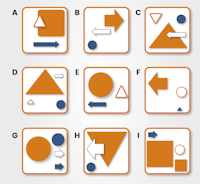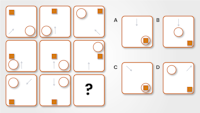Logical Reasoning Tests (2025 Guide)
All products and services featured are independently selected by WikiJob. When you register or purchase through links on this page, we may earn a commission.
Logical reasoning tests (also known as critical reasoning tests) are designed to assess a candidate's ability at skills such as how to interpret patterns, number sequences or the relationships between shapes.
As such they have much in common with diagrammatic tests, as well as abstract reasoning tests and inductive reasoning tests.
There are also verbal versions of logical tests, examples of which we'll cover in more detail below.
Logical reasoning tests assess a candidate's ability to use structured thinking to deduce from a short passage which of a number of statements is the most accurate response to a posed question.
This involves the ability to isolate and identify the various components of any given argument.
Logical reasoning tests are frequently used during the application process at investment banks, accountancy & professional services firms and consulting firms, among others.
The tests are usually provided by an external supplier, such as SHL or Kenexa.
If you want to practise example tests and improve your performance, you can take practice logical reasoning tests on JobTestPrep.
Why Do Employers Use Logical Reasoning Tests?
Employers use logical reasoning tests as part of their selection process for several reasons:
- Assessing problem-solving skills: Logical reasoning tests evaluate an individual's ability to analyze information, identify patterns, and draw logical conclusions. These skills are crucial in many job roles that require critical thinking and decision-making.
- Predicting job performance: Logical reasoning tests can provide insights into an individual's cognitive abilities, which can be indicative of their potential to perform well in tasks that require logical reasoning and problem-solving on the job.
- Standardized assessment: Logical reasoning tests provide a standardized way to compare and evaluate candidates objectively. They offer employers a consistent and reliable measure to assess candidates' abilities and make informed decisions during the hiring process.
Prepare for Any Job Assessment Test with JobTestPrep
What Is a Logical Reasoning Test?
The most common form of logical reasoning test you'll come across is the diagrammatic version, which we'll cover first.
As some employers also like to use verbal logic tests, we cover how to tackle those, with example questions, in the second section.
Diagrammatic Logical Reasoning Tests
These types of question require you to look at some data, identify the pattern or rules, and then spot which object does not meet those rules.
Watch out for relative position, number of items, relationship between items, colour, shape, and orientation of shapes: there are many different variations on these rules and there may be some extraneous data in there that complicates the rules.
Let's have a look at a couple of examples.
And if you're looking for further ones to try, take a look at these practice test packages.
Prepare for Any Job Assessment Test with JobTestPrep

Identify the odd one out.
Prepare for Any Job Assessment Test with JobTestPrep

Identify the missing square.
Prepare for Any Job Assessment Test with JobTestPrep
Verbal Logical Reasoning Tests
Verbal logic tests always consist of a series of questions (usually 20 to 30) based on short passages called stimuli.
Each stimulus takes the form of an argument – a conclusion based on evidence.
You will need to understand the stimulus to answer the questions based on it.
Common types of questions include weakening, strengthening, assumption, main point, inference, and parallel logic.
Each is designed to test your ability to understand, analyze, evaluate and manipulate arguments.
Test-Taking Strategy
The best approach to tackling logical reasoning tests entails being an active reader.
This means thinking about what you're reading; paraphrasing the complicated parts; determining the topic, scope, the author's purpose and passage structure, and author's voice; and asking yourself questions about the passage.
Prepare for Any Job Assessment Test with JobTestPrep
Understanding Assumption
One type of logical reasoning question involves identifying an assumption.
An assumption bridges the gap between an argument's evidence and conclusion.
It is a piece of support that is not explicitly stated but that is required for the conclusion to remain valid.
When a question asks you to find an author's assumption, it's asking you to find the statement without which the argument falls apart.
In order to test whether a statement is necessarily assumed by an author, you can use the denial test.
Simply deny or negate the statement and see if the argument falls apart.
If it does, that choice is a necessary assumption.
If, on the other hand, the argument is unaffected, the choice is wrong.
Let's consider an example:
"Edward plays badminton for Epsom High School. Therefore, Edward must be over six feet tall."
In this statement, the second sentence is the conclusion and the first sentence is the evidence for it.
However, in this case the argument is not complete.
The piece that is missing is the assumption.
From the information above, we can rephrase the example as: "All badminton players for Epsom High School are over six feet tall".
Now we can use the denial test. If it was not true that all badminton players for Epsom High School are over six feet tall, then we could not logically conclude that Edward must be taller than six feet.
It would be possible that he was, but it would also possible that he was not.
By denying the statement like this, the argument has fallen to pieces; it is no longer valid.
This is our proof that the statement above is a necessary assumption of this argument.
Example Verbal Logic Question
This is an example of a typical question from a verbal logical reasoning test:
"If all beaches were publicly owned, we would have to rely on government funds to maintain them. It is true that more people would have access to the ocean and beaches, but at what cost? If the beaches are not cared for adequately, soon there will be nothing left worth having access to. We should consider carefully before nationalizing more coastal property."
Which of the following, if true, would most weaken the argument above?
- A - The public does not want additional access to beaches.
- B - The government is currently responsible for the maintenance of all public and private beaches.
- C - The public already has some access to many beaches.
- D - Other property has been nationalized in the past, with no complaints from the original owners of the property.
- E - Some privately owned beaches are not well maintained.
Tips on How to Prepare for Your Logical Reasoning Test in 2025
Logical reasoning ability is closely correlated with general intelligence.
However, familiarity with the types of questions you might face and some strategies for solving the questions will certainly help you perform better.
Here are our five top tips:
- Practice sample diagrammatic IQ tests. Many test publishers also provide practice tests that you can access, such as JobTestPrep; this is certainly worth doing.
- It can be useful to develop a mental checklist of strategies to solve logical reasoning questions, such as a list of different rules that govern size, shape, number etc. This can help you to work more methodically in the test.
- Look at one rule at a time. There may be extraneous data within the question, which is designed to confuse you. Focusing on a single aspect can help you work out what is important and what's not.
- Manage your time. Sometimes you will come up against a question where you just cannot see the answer. Tempting as it can be, don't spend too much time on it. Move on and if you have time at the end, go back and check it.
- If you’re struggling to find a pattern, sometimes there are clues in the answers. Look for any patterns or themes in the possible answers; that might help you spot what is important within the question. For example, if you have a sequence of shapes and all of the answers are squares or triangles, you know that the next shape in the sequence must be either a square or a triangle, which could help guide you as to why.
Take a Free Logical Reasoning Test
Below is a logical reasoning test for you to try out.
It was created by WikiJob in association with psychometric experts and is closely modelled on real tests.
The test consists of 10 questions to be answered in 10 minutes (although note there is no timer on the test itself).
Our tests are slightly harder than the real thing, in order to make them sufficiently challenging practice.
You can take the test as many times as you like.
Click the 'Take Test' link below on either to get started.
Logical Reasoning Practice Test
| Questions | 10 |
| Pass Percentage | 80% |
| Time Limit | 10 min |
Prepare for Any Job Assessment Test with JobTestPrep
A logical reasoning test is used to assess the rational thinking and problem-solving abilities of the test taker.
By establishing the way a candidate interprets the relationships between objects and ideas, recognizes shapes and patterns, and can understand and evaluate arguments, make inferences, and spot fallacies, a logical reasoning test can predict the future success of a potential employee or a student applying for a gifted and talented program.
A logical reasoning test can be used as part of a pre-employment screening process, for assessing the capabilities of a student and to determine training and development needs for employees already in a role.
In most cases, logical reasoning tests are taken online, and they are structured with multiple choice answers.
Logical reasoning tests are most used in pre-employment screening, and you are most likely to come across them in the recruitment process for graduate or executive positions, as well as roles that need a high level of critical and logical thinking.
Logical reasoning assessments might be part of the learning and development planning for employees already in the role, to assess them for potential promotions or leadership opportunities.
Logical reasoning tests are also used in educational settings, sometimes to assess a student for entry into gifted and talented programs, or when they apply to a particular college course or for an apprenticeship.
Several different types of logical reasoning can be assessed through logical reasoning tests.
Inductive reasoning takes specific information to form a general conclusion and is often evaluated using patterns and sequences in shapes and images (sometimes known as abstract or diagrammatic reasoning).
Deductive reasoning is the opposite of inductive reasoning; it means taking general information and using it to come to a specific conclusion. These types of tests are usually verbally based, using written information.
Critical thinking is another facet of logical reasoning, and in this type of test, you will be assessed on the way you can analyze arguments, spot fallacies, evaluate conclusions, and make inferences.
Logical reasoning assessments are designed to measure logical and critical thinking, and they are designed to draw out the way a candidate makes decisions through a logical thinking process.
With the right test, calibrated to suit the role, a logical reasoning assessment provides quantifiable and accurate data on the suitability of a candidate based on their ability to solve problems. This is not something that can be found on a CV, or even in other types of aptitude tests or psychometric assessments.
The first thing to do when you know you are likely to face a logical reasoning test is to find out who the test publisher is. Once you know who the publisher is going to be, you can find relevant practice tests online to complete.
Even without knowing the publisher, practice is perhaps the most important strategy to use for passing a reasoning test.
Practice will help you decide where to focus your efforts when it comes to making study plans and completing revision – you need to spend time improving the areas you found more difficult in the practice test.
On the day, make sure that you are well-rested and have eaten well, and stay hydrated.
Read every question carefully and make sure you know what is expected of you at every stage. Take your time – even on a timed test, rushing can cost you marks if you miss a simple answer because you did not take the time to read the provided information.
When you know what publisher created the logical reasoning test that you are facing, you can often find practice tests on their website.
These are an excellent choice for those that need more practice and will help you feel comfortable and confident in the actual assessment because they will be structured and designed in the same way as the real thing.
If you do not know which publisher it will be, or you need extra practice, you can make use of the practice tests available on sites like JobTestPrep.
Here you can take generalized logical reasoning assessments, focus on inductive or deductive reasoning, or find specific publisher tests to practice.
There are several books available online and in bookstores that can help you prepare for your logical reasoning tests.
Many of them are generalized, with information designed to help both students and hopeful job applicants to improve their skills.
There are a lot of Android apps available that you can use to improve your logical reasoning abilities, from simple brain training games to specific logical reasoning practice tests.
The app called IQ and Aptitude Test Practice is free, although you might be asked to make in-app purchases for some features. It offers different test types and options so you can try out different question structures.
There is an app available on Android called Logical Reasoning, which is specifically aimed at improving your logical thinking ability. With different tests available, this free app is a great way to practice reasoning on the go.
Lumosity is a brain-training type of application, with a game system developed by neuroscientists. It is designed to improve attention, memory, speed and problem solving.
Elevate – Brain Training is another fun, game-based app that boasts a personalized training program that boosts productivity, learning ability, cognitive skills, self-confidence, processing speed and focus.
The best tip to follow to crack the logical reasoning test is to practice – so find a reputable source for publisher-relevant tests.
When you are practicing, stick to exam conditions to replicate the way you will be answering in the real thing.
When you have completed the practice test, look at the questions that you got wrong – this is where you will need to focus your revision.
Hone your skills in unusual ways – through mobile games and brain training apps, looking at drawing conclusions and finding inferences in newspaper articles, and thinking logically about different problems.
On the day, make sure that you have had a good night’s sleep so you are well-rested and ready to face the test. Eat well and focus on sustainable energy, and drink plenty of water. A well-fed, awake and hydrated brain will help you perform at your best.
Make sure you take your time answering the questions. This means reading the questions and the provided information carefully – you might be under timed conditions in the test but rushing could mean you miss an easy answer.
SHL offers remote proctoring for its online logical reasoning tests.
This means that SHL will use different techniques to ensure that you are not cheating the test and that you are working in the right way.
Some of these techniques include:
- Periodic image capture
- Multi-face detection
- Browser toggle
- Screenshot or copy & paste
By monitoring these actions, SHL can tell if it is you taking the test, if someone is looking over your shoulder (and potentially helping you) or if you are toggling between screens to get the answer.
It can also tell if you simply copy/paste your answers.
In most cases, you can cheat in an online logical reasoning test. Many people might consider it to get ahead and give themselves a better chance in the pre-employment screening to land their dream job.
One of the ways that people might cheat in a logical reasoning test is to get someone else to take the test for them – either a friend or by paying a service to do it.
For the more tech-savvy – and those with more time on their hands – getting access to the question bank and knowing the answers ahead of time is another cheat.
This can involve screenshotting the questions in the test as they appear and then telling the publisher that they lost connection, or creating many different usernames to take the test and hoping that they get all the questions that way.
It is not worth cheating, however.
Both test publishers and employers have ways to tell if someone has cheated on a logical reasoning test, including making the candidate resit the test at an assessment center or remotely proctoring the assessment, and having exceptionally large question banks.
Even if you can get through the test process with a cheat, part of the reason you take the assessment is to ensure that you would be a good fit for the role – and if you lack the logical or critical thinking skills, you might not be cut out for it.
Remember, if you are found to be cheating, not only will you not be hired but you are likely to be unable to apply for any position in that company in the future.
Logical reasoning involves analyzing a series of statements or premises and drawing a logical conclusion based on the information provided.
Here's an example to illustrate logical reasoning:
Premise 1: All mammals have hair.
Premise 2: Dogs are mammals.
Based on these premises, we can use logical reasoning to draw a conclusion:
Conclusion: Therefore, dogs have hair.
In this example, we start with the premise that all mammals have hair.
The second premise states that dogs are mammals.
By using logical reasoning, we can conclude that dogs must have hair because they possess the characteristic of being a mammal, which is known to have hair.
Logical reasoning involves understanding the relationships between statements, identifying patterns or rules, and using deductive or inductive reasoning to draw accurate conclusions based on the available information.
It is a fundamental aspect of critical thinking and problem-solving, and it is often assessed in cognitive ability tests and assessments.
There are several publishers that specialize in creating logical reasoning tests and assessments.
Here are some common logical reasoning test publishers:
- SHL (Cognitive Ability Tests)
- Kenexa (IBM Assessments)
- Talent Q
- Cubiks
- Saville Assessment
- Criteria Corp
Logical reasoning can be categorized into different types based on the underlying principles and methods used.
Here are some common types of logical reasoning:
- Deductive Reasoning
- Inductive Reasoning
- Abductive Reasoning
- Analogical Reasoning
- Critical Thinking
- Conditional Reasoning
When taking a logical reasoning test, it's important to carefully read and follow the instructions provided.
While the specific instructions may vary depending on the test publisher and the test itself, here are some general instructions you may encounter in a logical reasoning test:
- Read the instructions carefully
- Familiarize yourself with the question types
- Manage your time
- Analyze the information provided
- Identify the logic or pattern
- Eliminate incorrect options
- Be logical and systematic
- Keep calm and focused
- Practice beforehand

















